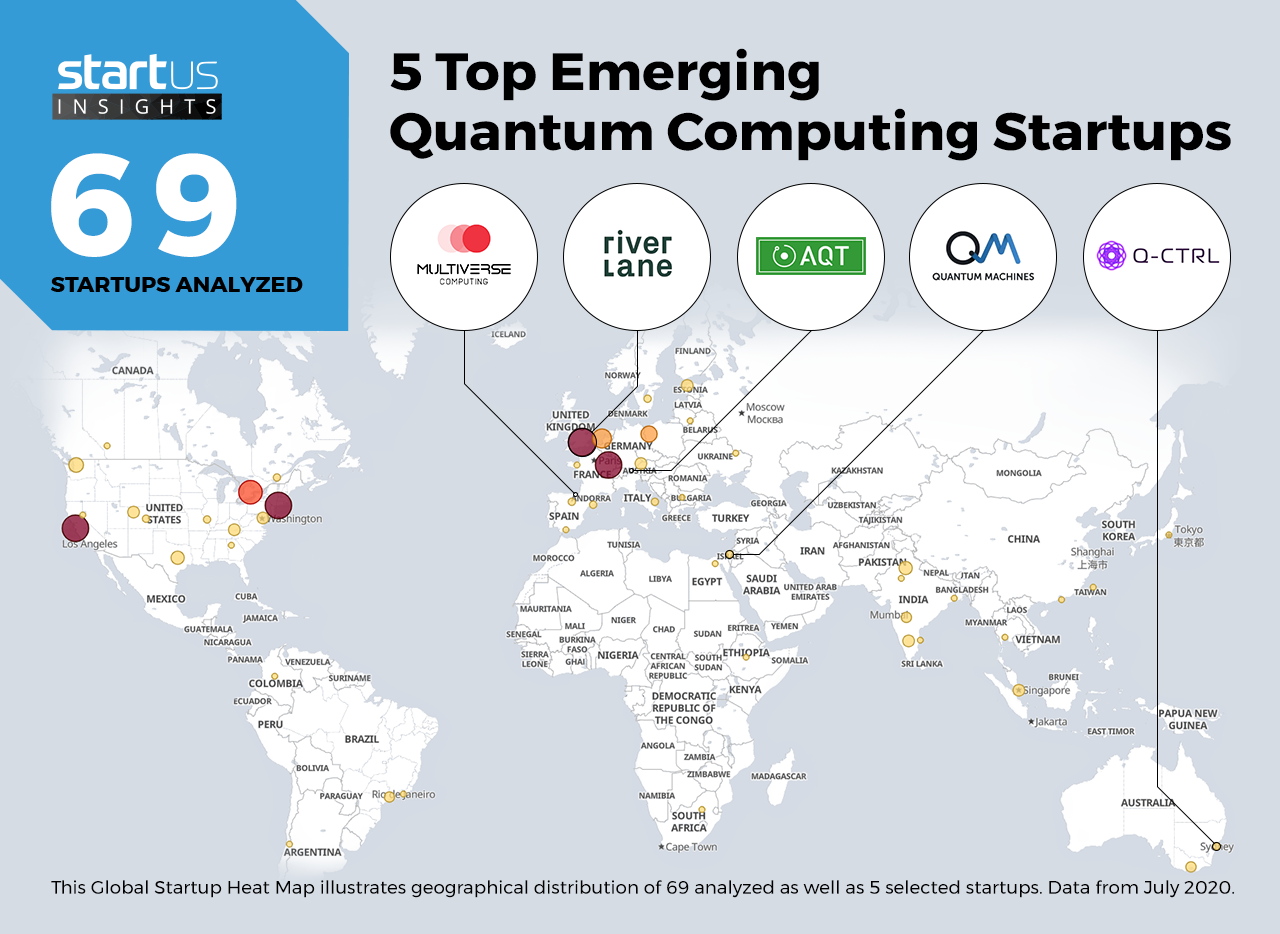Our Innovation Analysts recently looked into emerging technologies and up-and-coming startups working on advanced computing solutions. As there is a large number of startups working on a wide variety of solutions, we want to share our insights with you. This time, we are taking a look at 5 promising quantum computing startups.
Heat Map: 5 Top Quantum Computing Startups
Using our StartUs Insights Platform, covering 1.116.000+ startups & emerging companies, we looked at innovation in the field of advanced computing. For this research, we identified 69 relevant solutions and picked 5 to showcase below. These companies were chosen based on a data-driven startup scouting approach, taking into account factors such as location, founding year, and technology among others. Depending on your specific criteria, the top picks might look entirely different.
The Global Startup Heat Map below highlights 5 startups & emerging companies developing innovative quantum computing solutions. Moreover, the Heat Map reveals regions that observe a high startup activity and illustrates the geographic distribution of all 69 companies we analyzed for this specific topic.
Multiverse Computing – Quantum Software
The second quantum revolution is poised to push the frontiers in various industries such as healthcare, finance, aerospace, material science, and defense. While there is a greater focus on software solutions as they require lesser investment compared to hardware solutions, startups are working on both hardware and software quantum solutions to achieve quantum supremacy.
Spanish startup Multiverse Computing provides quantum software for the financial industry. The startup employs approaches such as gate model computing, quantum annealing, and Gaussian Boson Sampling (GBS) to solve portfolio optimization problems, conduct risk analysis, and eliminate market simulation concerns.
Riverlane – Operating Systems (OS)
Today’s quantum computers usually contain both classical and quantum computing elements. The classical processing layer compiles quantum algorithms into microinstruction, processes the quantum-state measurements, and calibrates the quantum processing unit. As a result, startups are developing operating system solutions for quantum computers based on this heterogeneous architecture.
British startup Riverlane develops an operating system for quantum computers. The OS allows access to all computing elements such as the CPU, field-programmable gate arrays (FPGAs), and qubits. As a result, users are able to extract more computing power from qubits and at low latency.
Q-CTRL – Hardware Optimization
The improvement in the computational power of quantum computers depends largely on qubit count and associated quantum error corrections. Quantum states are fragile and introduce noise and errors resulting in highly unstable quantum computers. Consequently, startups are in the race to optimize and control quantum hardware systems.
Australian startup Q-CTRL provides hardware-agnostic cloud-based software for quantum computers. The firmware solutions help users in the identification of potential errors, optimization of performance, and improving algorithms to make quantum machines stable and reliable.
Quantum Machines – Programming Language
Quantum computing research and development face difficulties when it comes to interoperability and scalability. Quantum computers developed by various groups make use of unique hardware coded in their languages of choice. Valuable time is lost in coding and building custom quantum programs and algorithms. This gives enough reason for emerging companies to create interoperable and scalable solutions.
Israeli startup Quantum Machines works on QUA, an intuitive pulse-level programming language for quantum computing. The hardware-agnostic algorithm is part of their Quantum Orchestration Platform which is a system that operates quantum processors. QUA is qubit-agnostic and supports all quantum processors.
Alpine Quantum Technologies – General Purpose Quantum Computing
The computing world is working towards the panacea of computing, namely, general-purpose quantum computers. The requirement of thousands of error-free qubits with full programmability is the main challenge to be tackled by startups and emerging companies for the realization of usable general-purpose quantum computers.
Austrian startup Alpine Quantum Technologies develops general-purpose quantum information processors. The startup makes use of a trapped-ion approach that is scalable and applicable across a wide range of industry verticals like material design, finance, and pharmaceuticals. Additionally, dedicated laser pulses are used to manipulate each qubit enabling general-purpose quantum computing.
What About The Other 64 Solutions?
While we believe data is key to creating insights it can be easy to be overwhelmed by it. Our ambition is to create a comprehensive overview and provide actionable innovation intelligence so you can achieve your goals faster. The 5 quantum computing startups showcased above are promising examples out of 69 we analyzed for this article. To identify the most relevant solutions based on your specific criteria, get in touch.







